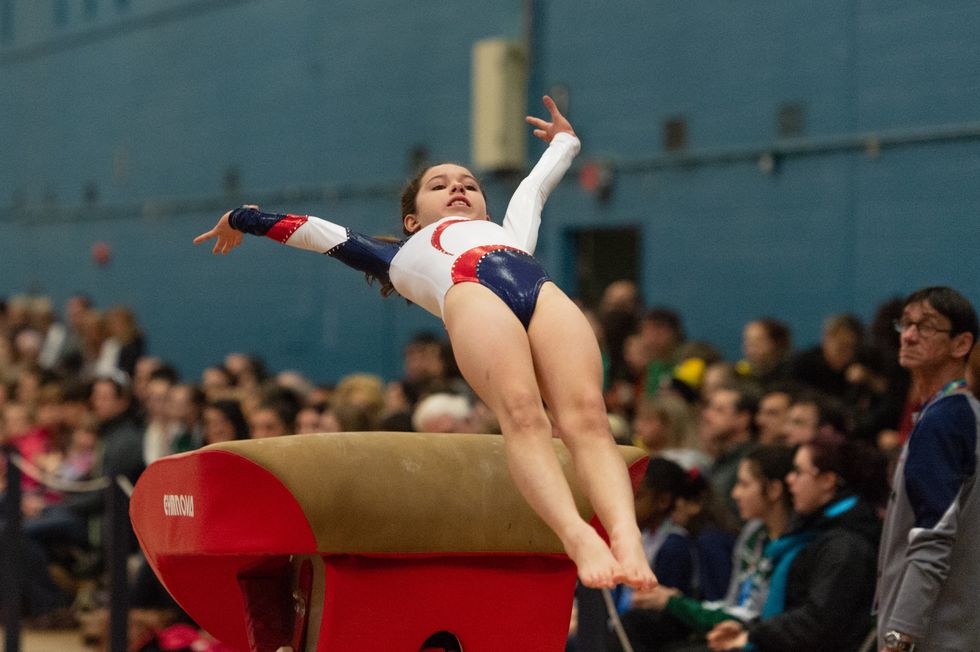A gym where everyone is more comfortable barefoot, with hair in a tight ponytail, and the smell of chalk thick in the air is the proud home of every gymnast. Growing up, one of the popular shirts sold at gymnastics meets read, "If gymnastics were easy it would be called football." I don't include this quote to incite a riot. I include this quote to bring attention to a sport that is only thought about during the Olympics or when Katelyn Ohashi broke the internet with her 10.0 floor routine.
Gymnastics is a sport with no off-season, involving flexibility, stamina, and grace. There are no protective helmets or pads. It's just you, your leotard, and the event you are competing. Gymnastics is the epitome of the phrase, "look like a beauty, train like a beast."
As a gymnast of about 11 years, I've had my fair share of injuries, fears, accomplishments that made me love the sport with all my heart, and failures where I wanted to quit on the spot. But the gym is where I grew up and made many good friends that I still have today. It taught me a love of dance that led me to pursuing musical theatre and color guard in high school, using my dance abilities, flexibility, tumbling skills, and no fear of falling during partner dance lifts. On the other hand, it allowed me to retire from the sport for two years, prompted by a previous injury.
Gymnasts push their bodies to limits that test flexibility, strength, and mental capabilities. But for the love of the sport and friendships made, gymnasts keep up the good fight. There are people that may disagree with me, but gymnastics is without a doubt the hardest sport in the world. Here are 9 reasons why.
Gymnastics requires tough physical training from a young age
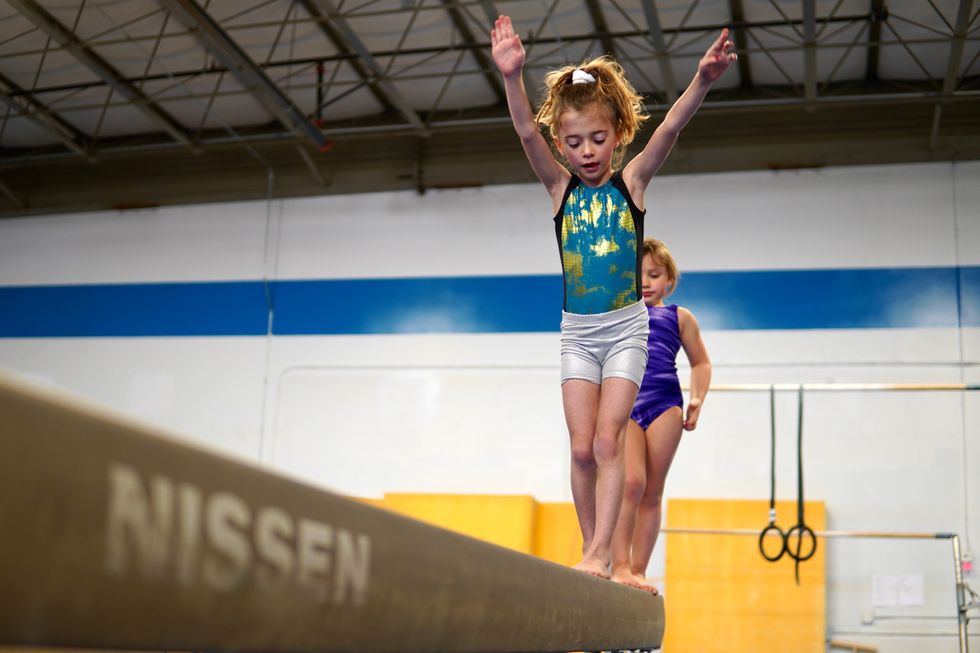 Photo by Brett Wharton on Unsplash
Photo by Brett Wharton on UnsplashGymnastics is best practiced beginning at a young age. It takes years of flexibility training and muscle forming to create the gymnasts that we see in the Olympics. Many gymnasts start training as young as three years old. They may train anywhere from 15 hours to 40 hours per week, with at least an hour of strength conditioning per practice. It is an odd sight to walk into a gym and watch 50 girls use only their toes to walk across the floor in order to specifically train toe muscles to stay on the beam. As the human body gets older, it becomes more difficult to form muscles and increase flexibility the way that gymnasts need them. You also become more prone to injury as the body gets older. The younger a person can start training, the sooner the gymnast's body will get used to the tough flips and leaps that must be completed.
Gymnastics is mind over matter
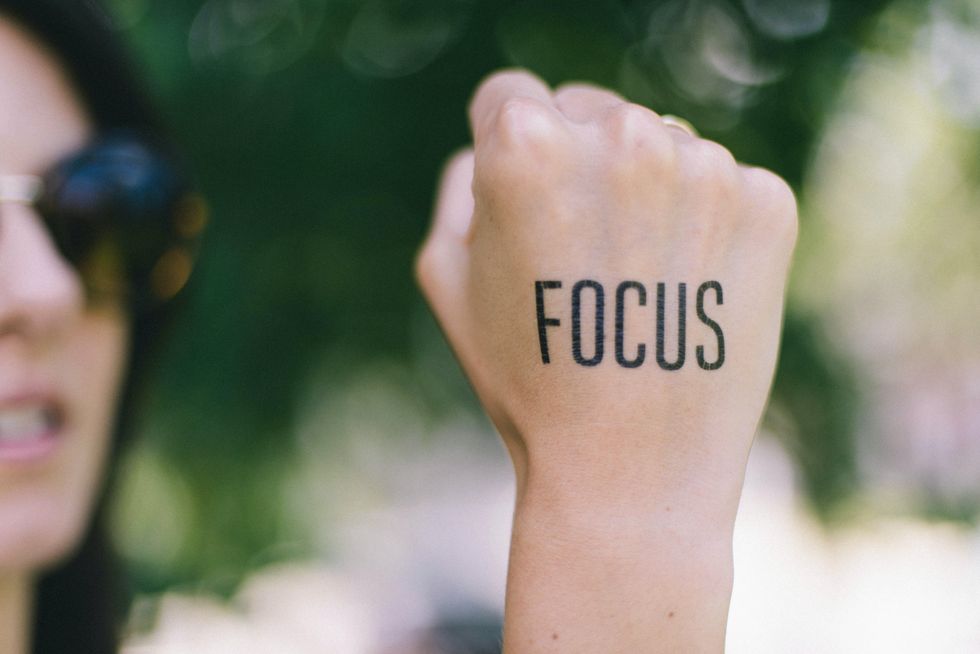 Photo by Chase Clark on Unsplash
Photo by Chase Clark on UnsplashWhile the first thing that most people think of when they hear "gymnastics" is Simone Biles effortlessly landing her signature move on the floor, gymnastics takes more than muscles. There comes a point in every gymnast's career where a skill or flip paralyzes their mind, convincing them that they just cannot complete the skill. Most often this mental block is fear. A gymnast will spend more effort trying to stay out of their own head than it takes to complete a conditioning circuit. Let me say from personal experience, the feeling of finally doing the skill you were once terrified of is the most exciting and rewarding feeling.
You are essentially competing against your best friends and teammates
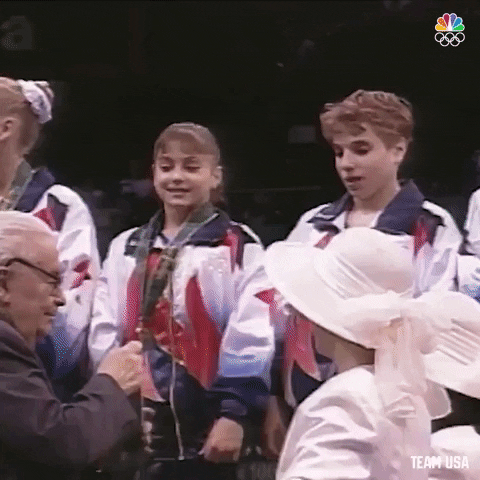 Giphy
GiphyGymnasts are individually scored on each event on a 10.0 scale, 10 being that no mistakes were made. Each gymnast will be fighting for first place in the individual events. The scores from each event will be added together, determining an "all-around" winner. However, gymnastics is still a team sport because the top scores from each team are added together, and the team with the highest score wins. From this, each gymnast can see the abilities of the competitor before them. Gymnasts will then push themselves to be better. At the same time, gymnastics also teaches a great sense of sportsmanship. Just because the girl or boy standing next to you is your competitor, doesn't mean that you won't cheer your heart out, encouraging them throughout their entire floor routine. You know your teammate's routine like the back of your hand, and you will be dancing along the sidelines with them. Gymnasts pick each other up when they fall, they encourage one another to conquer their fears and try the new skill that is a little scary.
Gymnasts need both endurance and super strength
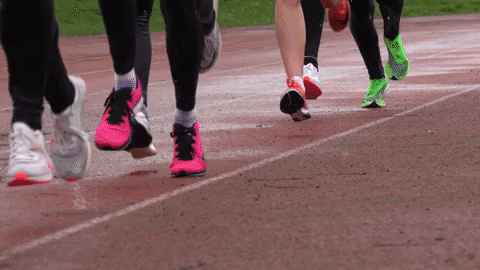 Giphy
GiphyAt first glance, it may look like gymnastics simply requires moving one's own body weight, but it actually requires a great level of endurance, particularly on the floor, uneven bars, and many of the men's events. A typical floor routine lasts a minute and a half. In this time, the gymnast must complete three tumbling passes, one leap, one turn, glue it all together with gorgeous choreographed dance moves, and do it all with a smile. The bars call for carefully planned breathing in between using your core to keep you moving. Gymnasts practice endurance through many sprints, running to their floor music, and running every practice.
Gymnasts fall...a lot
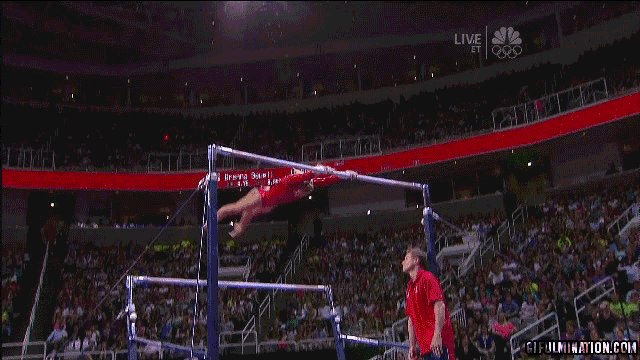 Giphy
GiphyGymnastics is a sport of trial and error. If you fall down, you've got to get back up again. It is the only way to get better and more confident. If I had a nickel for every time I fell in a single practice, I'd have at least one dollar per practice. Each fall is one step closer to perfecting the skill. Yes, it hurts, but learning to fall safely is one of the first things a gymnast learns. But the first time you finally land the vault, or stick the dismount on bars, is the best reward of hard work.
The injuries are either absolutely awful, or occur from tripping over the beam
By the end of a gymnast's career, an injury will have plagued them at some point. Rolled ankles and hyper-extended knees are some of the most common injuries. Unfortunately, one wrong step or landing with straight legs will cause them. Injuries must be taken care of properly, but you also need to keep conditioning to stay in shape for when the doctor clears the gymnast back to practice. It is imperative to practice conditioning to strengthen the muscles and bones that are most prone to injury in the hopes of prevention.
Self discipline is possibly the most important quality needed
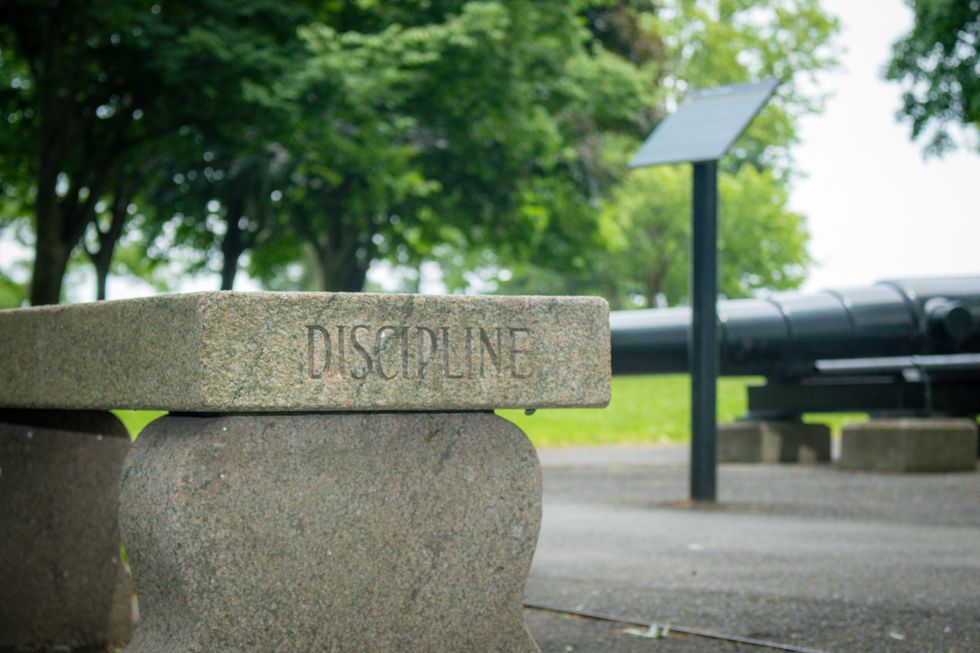 Photo by Dave Lowe on Unsplash
Photo by Dave Lowe on UnsplashGymnastics requires more as an individual than baseball or basketball team would. The team works together as separate individuals. The individual gymnasts have to want to be in the gym, putting in the effort, and pushing themselves. Coaches and teammates can only provide so much encouragement and advice. Gymnasts must be willing to push themselves, do what it takes to make themselves better. This may be setting a schedule for homework that works around practices, stretching on family vacations, or seeking help when needed.
Gymnastics only offers one chance
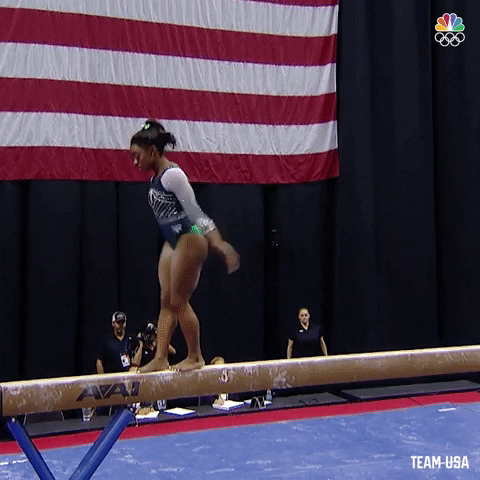 Giphy
GiphyA basketball game has two halves, hockey has three periods. These sports offer hours to the athletes trying to score goals and make baskets. They have time to create a strategy and put in new players. When competing in a gymnastics meet, it's just you, the apparatus, and about one-minute to prove yourself to the judges. There are no do-overs or instant replays. One chance per meet is all a gymnast gets to make their mark.
Lastly, gymnastics expects perfection, but it is rarely achieved
 Giphy
GiphyNotice how there are only nine bullet points? The coveted "Perfect 10" that was first achieved 44 years ago by a 14-year-old Nadia Comaneci, is the goal of every gymnast. On the original 10.0 scale, this was the highest that any gymnast could score on an event. When competing, the task is to earn as close to a 10.0 as possible. A perfect 10 has been achieved many times since 1976, but it isn't a common score to see. Sometimes the highest a gymnast will ever score is a 9.6, other times it may be a 8.9. No matter the score, gymnasts constantly push themselves to be better than the last competition, than the last turn they took at practice. A 9.5 might be a good score, but if the gymnast can work to earn a 9.55 at the next meet, they will put in 110%.
- How An Olympic Gymnast Achieves A Perfect 10 In And Out Of The Competition ›
- The 4 Most Disciplined Sports ›
- Why I Love Gymnastics ›

